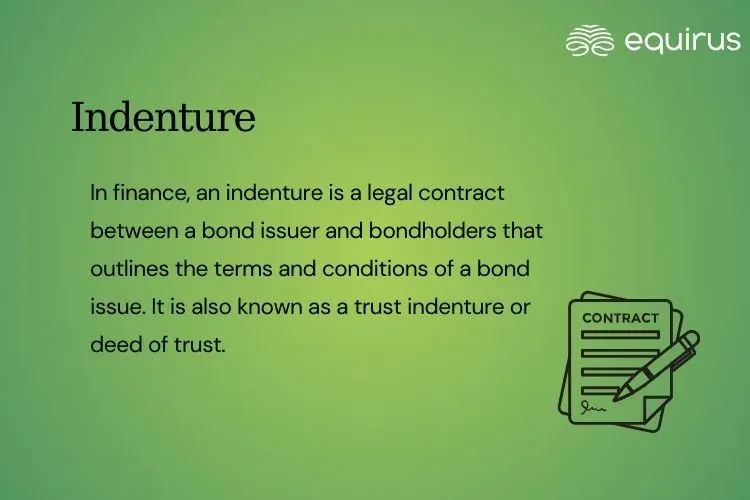Indenture

Key Highlights
-
In finance, an indenture is a legal contract between a bond issuer and bondholders that outlines the terms and conditions of a bond issue. It is also known as a trust indenture or deed of trust.
-
Indenture includes issuer, bondholders and trustee.
What is Indenture?
In finance, an indenture is a legal contract between a bond issuer and bondholders that outlines the terms and conditions of a bond issue. It is also known as a trust indenture or deed of trust.
Think of it as the official rulebook that governs the bond—covering everything from payment terms to investor protections.
What Does an Indenture Include?
An indenture provides all the critical details about the bond, such as:
| Component | Explanation |
|---|---|
| Principal amount | Total amount to be repaid to bondholders at maturity |
| Interest rate (coupon) | The percentage paid annually/semi-annually to investors |
| Maturity date | When the bond will be repaid in full |
| Payment schedule | Frequency of interest payments (e.g., annually, semi-annually) |
| Covenants | Rules the issuer must follow (financial and operational) |
| Redemption terms | Whether the bond can be called (paid back early) and under what conditions |
| Default terms | What happens if the issuer fails to meet its obligations |
| Trustee’s role | A third-party trustee represents and protects bondholder interests |
Who is involved in an Indenture?
-
Issuer: The company or government issuing the bond.
-
Bondholders: The investors who purchase the bonds.
-
Trustee: A neutral third party (usually a bank or trust company) that ensures the issuer complies with the indenture terms and acts on behalf of bondholders if needed.
Purpose of an Indenture
1. Legal protection: Protects bondholders by legally binding the issuer to specific actions.
2. Transparency: Clearly defines rights and obligations for both parties.
3. Enforcement: Enables bondholders or trustees to take legal action in case of default.
Types of Indentures
1. Open-End Indenture: Allows the issuer to release additional bonds under the same indenture in the future.
2. Closed-End Indenture: Limits the issuance of new bonds under the same indenture to protect current bondholders.
3. Subordinated Indenture: Covers bonds that are paid after other debts in case of bankruptcy.
